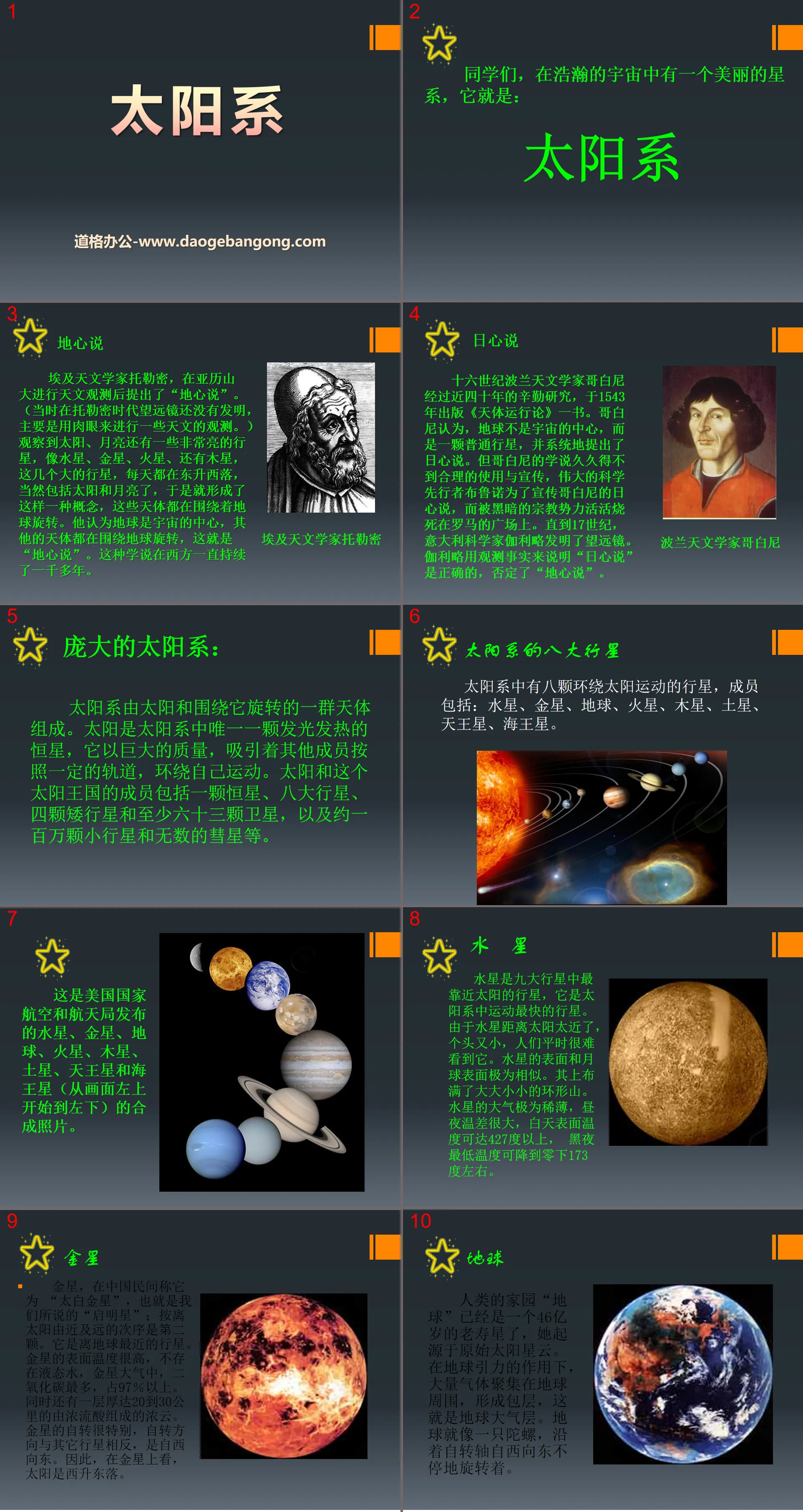Fifth Grade Science Volume 1, Textbook Edition
Science Edition for Sixth Grade Science Volume 2
Science Edition for Sixth Grade Science Volume 1
Third Grade Science Volume 2, Textbook Edition
Third Grade Science Volume 1, Textbook Edition
Fourth Grade Science Volume 1, Textbook Edition
Fourth Grade Science Volume 2, Textbook Edition
Fourth-grade science volume 2 of the E-education edition
Qingdao Edition Fourth Grade Science Volume 2
Hunan Education Edition Fourth Grade Science Volume 1
E-education edition fifth grade science volume 1
E-education edition fifth grade science volume 2
Fifth Grade Science Volume 2, Textbook Edition
E-education edition sixth grade science volume 1
Zhejiang Education Edition Seventh Grade Science Volume 2
People's Education Press Fourth Grade Science Volume 2

| Category | Format | Size |
|---|---|---|
| People's Education Press Sixth Grade Science Volume 2 | pptx | 6 MB |
Description
"Solar System" Infinite Universe PPT Courseware
Geocentric
The Egyptian astronomer Ptolemy proposed the "geocentric theory" after conducting astronomical observations in Alexandria. (Telescopes had not yet been invented in the Ptolemaic era, and astronomical observations were mainly made with the naked eye.) The sun, moon, and some very bright planets, such as Mercury, Venus, Mars, and Jupiter, were observed. A large planet rises in the east and sets in the west every day, including of course the sun and the moon, so a concept was formed that these celestial bodies are rotating around the earth. He believed that the earth was the center of the universe and that all other celestial bodies revolved around the earth. This was the "geocentric theory." This doctrine has persisted in the West for more than a thousand years.
heliocentric theory
Copernicus, a sixteenth-century Polish astronomer, published "On the Revolutions of the Celestial Bodies" in 1543 after nearly forty years of diligent research. Copernicus believed that the earth was not the center of the universe, but an ordinary planet, and systematically proposed the heliocentric theory. However, Copernicus's theory has not been properly used and promoted for a long time. Bruno, the great scientific pioneer, was burned alive in the square of Rome by the dark religious forces in order to promote Copernicus' heliocentric theory. It was not until the 17th century that Italian scientist Galileo Galilei invented the telescope. Galileo used observational facts to prove that the "heliocentric theory" was correct and denied the "geocentric theory".
The eight planets in the solar system
There are eight planets orbiting the sun in the solar system, including: Mercury, Venus, Earth, Mars, Jupiter, Saturn, Uranus, and Neptune.
Mercury
Mercury is the planet closest to the sun among the nine planets, and it is the fastest moving planet in the solar system. Because Mercury is so close to the sun and so small, it is difficult for people to see it. The surface of Mercury is very similar to the surface of the Moon. It is covered with large and small craters. Mercury's atmosphere is extremely thin, and the temperature difference between day and night is large. The surface temperature during the day can reach over 427 degrees, and the lowest temperature at night can drop to about minus 173 degrees.
Venus
Venus, known as "Taibai Venus" among Chinese people, is also what we call the "morning star"; it is the second star in order from closest to far from the sun. It is the closest planet to Earth. The surface temperature of Venus is very high, and there is no liquid water. The atmosphere of Venus contains the most carbon dioxide, accounting for more than 97%. At the same time, there is also a thick cloud composed of concentrated acid flowing 20 to 30 kilometers thick. Venus's rotation is very special. It rotates in the opposite direction to other planets, from west to east. Therefore, from Venus, the sun rises in the west and sets in the east.
Earth
"Earth", the home of mankind, is already 4.6 billion years old. She originated from the primitive solar nebula. Under the influence of the earth's gravity, a large amount of gas gathers around the earth to form an envelope, which is the earth's atmosphere. The earth is like a top, spinning continuously from west to east along its axis.
Keywords: infinite universe teaching courseware, solar system teaching courseware, PPT courseware download for the second volume of sixth grade science from the People's Education Press, sixth grade science slide courseware download, infinite universe PPT courseware download, solar system PPT courseware download, .PPT format;
For more information about the "Solar System Infinite Universe" PPT courseware, please click the Solar System PPT Infinite Universe PPT tab.
"Solar System" universe PPT teaching courseware:
"Solar System" Universe PPT teaching courseware Part One: Review of the previous section 1. When do solar and lunar eclipses generally occur in the lunar calendar? What moon phase? 2. What are the types of solar and lunar eclipses? 3. Try to explain the reasons for the solar eclipse in your own words. 4...
"Solar System" universe PPT download:
"Solar System" Universe PPT download Part 1: Introduction of new lessons In addition to the earth and the moon, what other celestial bodies do we know that are moving around the sun? What are the characteristics of these celestial bodies? How are they arranged? ... ... ... Solar system PPT, second...
"Solar System" Universe PPT:
"Solar System" Universe PPT Part 1 content: Understand that the solar system is centered on the sun, including the eight major planets that revolve around it (including satellites that revolve around the planets), dwarf planets, and small celestial bodies (including asteroids, meteors, comets, etc.) The system is called...
File Info
Update Time: 2024-11-19
This template belongs to science courseware People's Education Press Sixth Grade Science Volume 2 industry PPT template
"Solar System" Infinite Universe PPT Courseware Simple campus recruitment activity planning plan summary enterprise and institution recruitment publicity lecture PPT template is a general PPT template for business post competition provided by the manuscript PPT, simple campus recruitment activity planning plan summary enterprise and institution recruitment promotion Lecture PPT template, you can edit and modify the text and pictures in the source file by downloading the source file. If you want more exquisite business PPT templates, you can come to grid resource. Doug resource PPT, massive PPT template slide material download, we only make high-quality PPT templates!
Tips: If you open the template and feel that it is not suitable for all your needs, you can search for related content "Solar System" Infinite Universe PPT Courseware is enough.
How to use the Windows system template
Directly decompress the file and use it with office or wps
How to use the Mac system template
Directly decompress the file and use it Office or wps can be used
Related reading
For more detailed PPT-related tutorials and font tutorials, you can view: Click to see
How to create a high-quality technological sense PPT? 4 ways to share the bottom of the box
Notice
Do not download in WeChat, Zhihu, QQ, built-in browsers, please use mobile browsers to download! If you are a mobile phone user, please download it on your computer!
1. The manuscript PPT is only for study and reference, please delete it 24 hours after downloading.
2. If the resource involves your legitimate rights and interests, delete it immediately.
3. Contact information: service@daogebangong.com
"Solar System" Infinite Universe PPT Courseware, due to usage restrictions, it is only for personal study and reference use. For commercial use, please go to the relevant official website for authorization.
(Personal non-commercial use refers to the use of this font to complete the display of personal works, including but not limited to the design of personal papers, resumes, etc.)
Preview










